General
Mak Council Chair Tips Guild House on True Leadership at ELP Orientation
Published
2 years agoon
By
Mak Editor
By Ritah Namisango
Makerere University in partnership with LIFE Ministry Uganda and the Global Leadership Summit is implementing the Emerging Leaders Program (ELP), the brainchild of the First Lady and Minister of Education and Sports, Hon. Janet Kataaha Museveni aimed at raising a dignified generation of youth in Uganda.
Addressing over 120 student leaders on the third day of the Emerging Leaders Program- orientation workshop on Saturday 21st October 2023, the Chairperson of Makerere University Council, Mrs. Lorna Magara applauded the Minister of Education and Sports for being a true mother committed to building a critical mass of young people and upcoming leaders grounded with values, good character, life skills and above all, a healthy generation that is free from HIV-AIDS.
The Chairperson of Makerere University Council informed the participants that on 2nd February 2023, Hon. Janet Kataaha Museveni inaugurated the University Council. At the inauguration, the Minister tasked the University Council to join her to implement a national Anti-Corruption and HIV/AIDS Campaign, starting with Makerere University.
Responding to this call, the University Council and Management engaged members of staff, student leaders and key stakeholders. The University Management carried out a survey and findings indicated that some of the students were already sexually active and needed help to know how to live a value based life, while others were grappling with drug abuse. In the survey, some of the respondents disclosed that they started using drugs before they joined the University due to peer pressure, stress and anxiety as well as exposure to such substances from some family members, slums and communities. During the engagements, some students revealed that they had knowledge of what constitutes good values, but in real life situations, they were facing challenges with sticking to the required values.
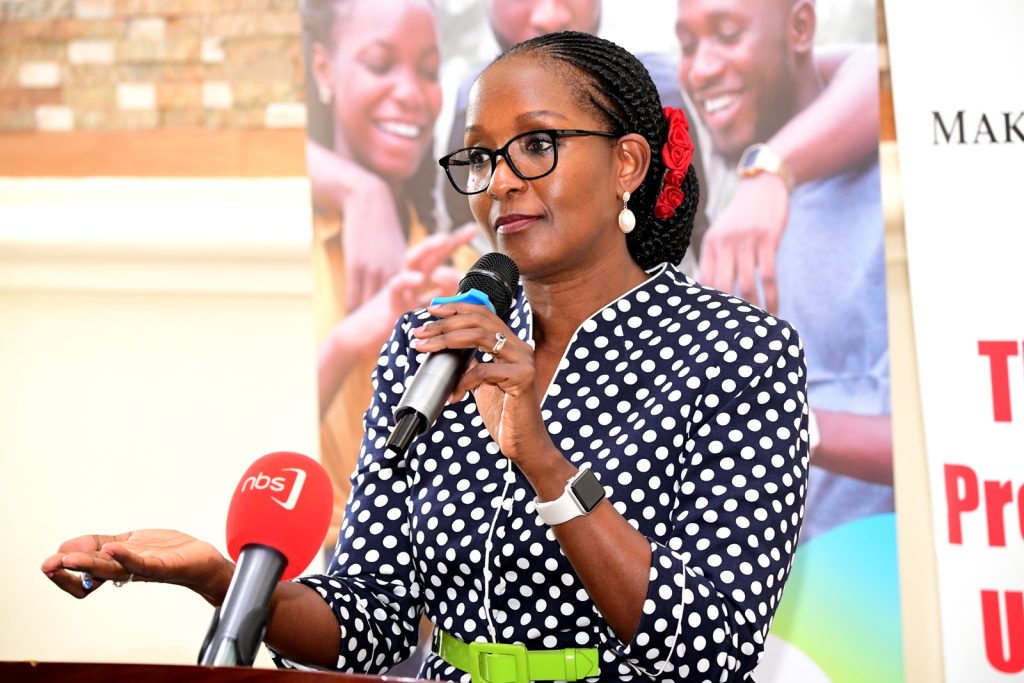
Personally touched by this deeper analysis of the underlying issues, the Minister of Education and Sports initiated the Emerging Leaders Program to equip and empower students with life skills, value based leadership and character development.
Mrs. Lorna Magara revealed that the Emerging Leaders program is a life skills program, aiming at fostering character mindset change at Makerere University, to influence the present and shape the future of our nation. She pointed out that the trainings would also entail a planned and deliberate effort to ensure that the youth take every step to remain healthy and free from HIV/AIDS as they pursue their studies at Makerere University.
“The Emerging Leaders Program is an empowerment initiative that focuses on values, character development and life skills. You may have the academic degree, but you need the right set of values and character to succeed in life,” said the Chairperson of Makerere University Council.
Mrs. Magara stated that the orientation workshop (19th to 21st October 2023) was organized to give participants exposure to the program content with the aim of enlisting them as active participants during its course of implementation. She commended the 125 student leaders, 60 lecturers as well as the Facilitators for accepting to be part of the program, and creating time to participate in the three-day orientation workshop. The workshop enabled participants to understand the objectives of the Emerging Leaders Program, learn and appreciate the key concepts, as well as set the pace for the unveiling of the Emerging Leaders Program and trainings that will commence next Semester.
On behalf of the students, the Guild Speaker, Rt. Hon. Babinga Gozan Wilson said that the Emerging Leaders Program was timely for it seeks to address the challenges faced by students and young people in general. The Guild Speaker noted that some of the students at the University are sexually active and engaging in relationships, which puts them at the risk of contracting HIV/AIDS and other sexually transmitted diseases. He added that some of the students were grappling with the issue of managing finances and how to overcome corrupt tendencies in a highly commercialized world advanced by competitive lifestyles espoused through social media.
In an interactive session with the Student Leaders on Saturday 21st October 2023, Mrs. Lorna Magara who has served as a leader at different levels in society shared with students the true meaning of leadership. She demystified the adage that some people are leaders while others are followers. She disclosed that such a narrative leads to slavery. She informed the student leaders that each and every one of us is a leader who has been gifted to lead and serve people in politics, church, family, community, in the lecture room, among other settings.
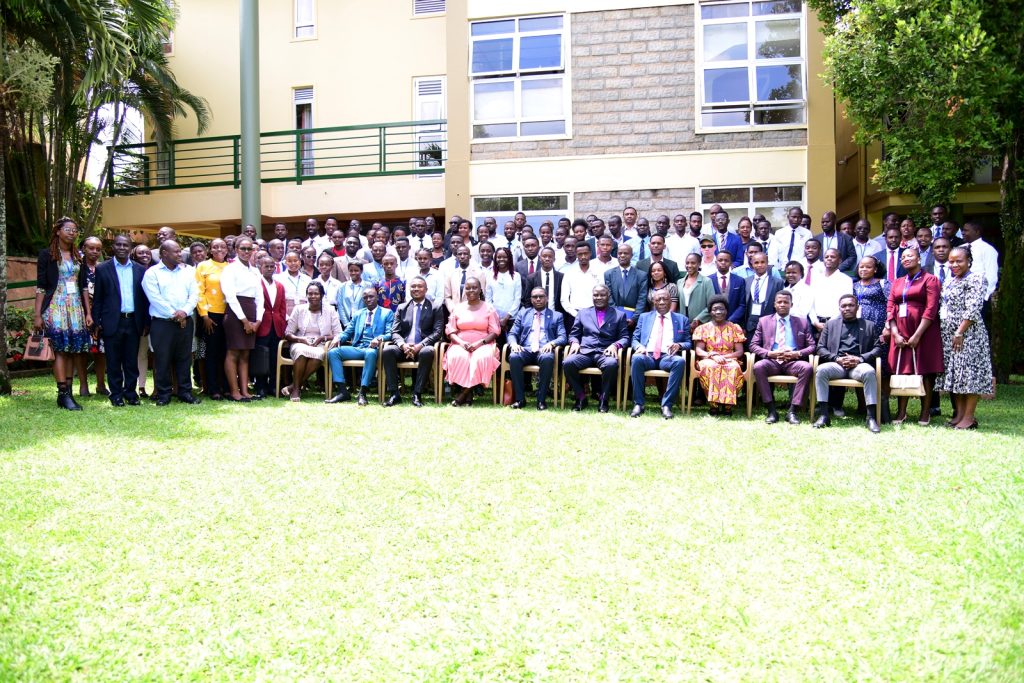
“Leadership is about discovering who you are. Leadership is about uniqueness and service. Leadership is about identifying your uniqueness, and the ability to use that uniqueness to serve society. Leadership is self-manifestation. You must value yourself. If you do not value yourself, no one will value you,” Mrs. Magara highlighted.
Acknowledging the role of social media, Mrs. Magara advised the student leaders to use social media to serve society, and cautioned them against the temptation of using social media to define who they are.
“Many of you receive so much information through social media. There is a growing trend of everyone desiring to be like some of the personalities presented to you by social media. When you start to imitate people, and convince yourself that you should be like them in all ways, then you begin to lose the true definition of who you are. Discover the uniqueness in you, use that uniqueness to be a leader who serves society,” she advised.
Underscoring the need to redefine leadership, Bishop Joshua Lwere, the Chairperson of the Board of Directors of Global Leadership Summit informed participants and journalists that leadership had reached a level where people take on roles not because they love the people, or want to serve, but for self glory.
“We notice that our leadership has degenerated so much, to the extent that people go into leadership not because they want to serve, or to carry the weight of people’s needs, but to use these positions to get personal enrichment,” he stated.
Bishop Lwere reiterated that leadership is not about occupying positions, but servanthood. He explained that the Emerging Leaders Program starting with Makerere University provides a platform to nurture young leaders to acquire leadership skills so that we can get a new breed of skilled leaders.
At the end of the session on character matters and valuing relationships, Bishop Lwere requested the student leaders who after going through the three days’ training were convinced that they were ready to change their lives by leaving the bad practices and adopting to the accepted standards.
“May I request those who are ready to commit to the new set of values, those who are saying, I will never defile my body again, those who are ready to stand strong like Joseph in the bible who refused to defy his God and Master when tempted by his Master’s wife, to raise up their hands, and after stand up. I would like to pray for you and bless you,” he said.
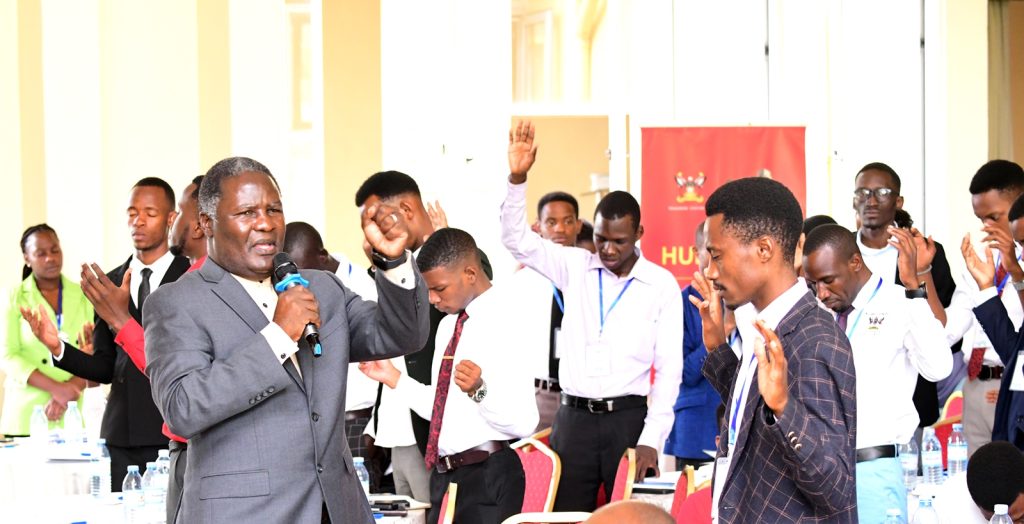
It was gratifying to see majority of the student leaders raising up their hands, and taking that bold step to commit to changing their life’s trajectory.
One of the Facilitators, Mr. Elon Katweheyo explained that the Family is the best unit to consider in values and character development. He shared that young people and students are part of the family. “At LIFE Ministry Uganda, we believe that we must focus on the young people. We are privileged to start this program at Makerere University-the premier University in Uganda, and the place full of young people and upcoming leaders. Through the Emerging Leaders Program, LIFE Ministry Uganda will apply its Life at the Crossroads character development tool to build and nurture morally upright youth,” remarked Mr. Katweheyo.
Rolling Out the Emerging Leaders Program
Following a successful orientation workshop, the Chairperson of Makerere University Council highlighted that the Emerging Leaders Program training sessions would commence early next year (2024). The team will identify teaching staff and Trainer of Trainers to be part of be part of the cohort to roll out the Emerging Leaders Program. She revealed that during the Semester, the First Lady and Hon. Minister of Education, Hon. Janet Kataaha Museveni will launch The SAFE Campaign under the Emerging Leaders Program. TheSAFE Campaign stands for Sexually Fortified, Addiction Free, Financially Stable and Education Focus. The University Management and teaching staff will roll out the program to the respective Colleges and Schools, and it is planned that every semester should have 20 units of training. After building a significant number of Trainers of Trainers, the Emerging Leaders Program will be rolled out to other universities in Uganda.
Emerging Leaders Program Orientation
The three-day orientation officially commenced on Thursday 19th October 2023 with a joint workshop of a select number of staff and all our student leaders. Delivering the opening remarks, the Team Leader, Global Leadership Summit Uganda, Ms. Betty Byanyima noted that the workshop was aimed at sharing ideas and discussing different aspects of the challenges of corruption and HIV/AIDS. The beneficiaries would then be charged with influencing their Halls of Residence, Schools, Hostels, Families and Communities because the aforementioned challenges go beyond Makerere.
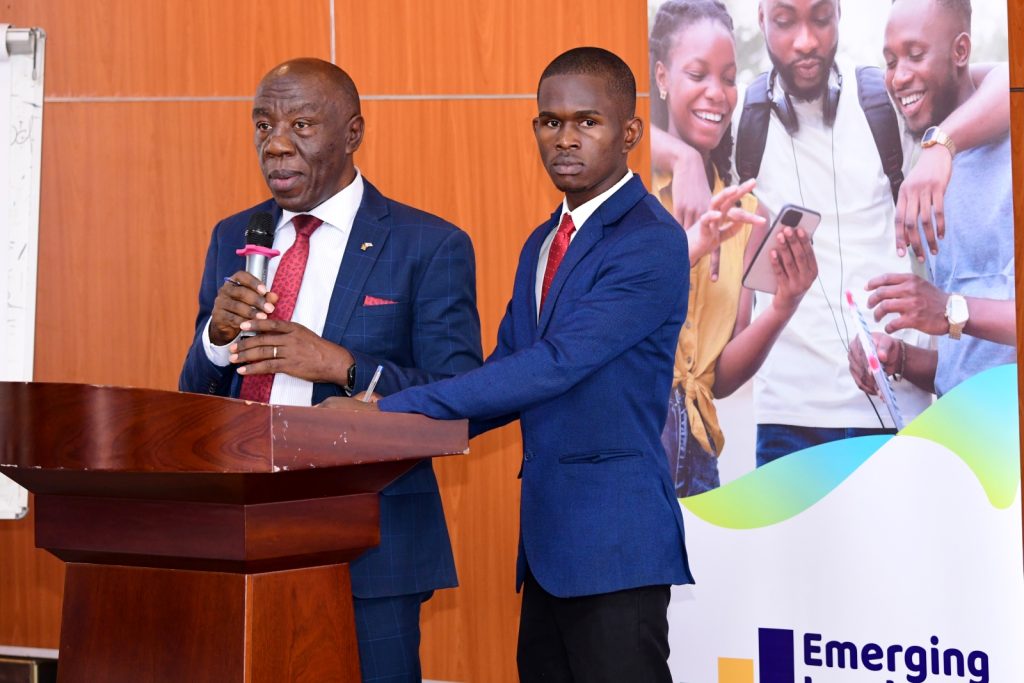
The Deputy Vice Chancellor (Finance and Administration) and Chair of the Emerging Leaders Program, Prof. Henry Alinaitwe acknowledged that Universities have got a big role to play in influencing change in societies. He encouraged the leaders to look beyond the dates of the workshop and feel free to draft dossiers on how best these challenges can be tackled, in the event that the time assigned is insufficient to comprehensively debate the various topics.
The Board Chairman of the Global Leadership Summit Uganda, Bishop Joshua Lwere who served as lead facilitator for Day One of the workshop not only provided great insights into self-governance but also matched it with a great delivery that kept his audience engaged. Furthermore, he noted that holistic education ought to address the 4Hs (Heart, Head, Hands and House) and emphasised the need for all to revere God, adding that the more one loves God, the more they loves oneself.
Describing it as the policeman within, Bishop Lwere asked his audience to protect their conscience and it will protect you them in times of crucial decisions. Failure to do this, he cautioned the leaders, would result in its voice growing softer until it eventually goes silent. “When you compromise on your way up – getting there by hook or crook – you cannot challenge the wrong you find up there. You have the hook in you.”
Bishop Lwere further noted that leaders who espouse self-sacrifice and moral aptitude inspire those they lead to do likewise. He emphasised the need for leaders to set a high level of discipline for themselves and to live by conviction, not convenience. As you continue to live by conviction, it becomes part of your character;
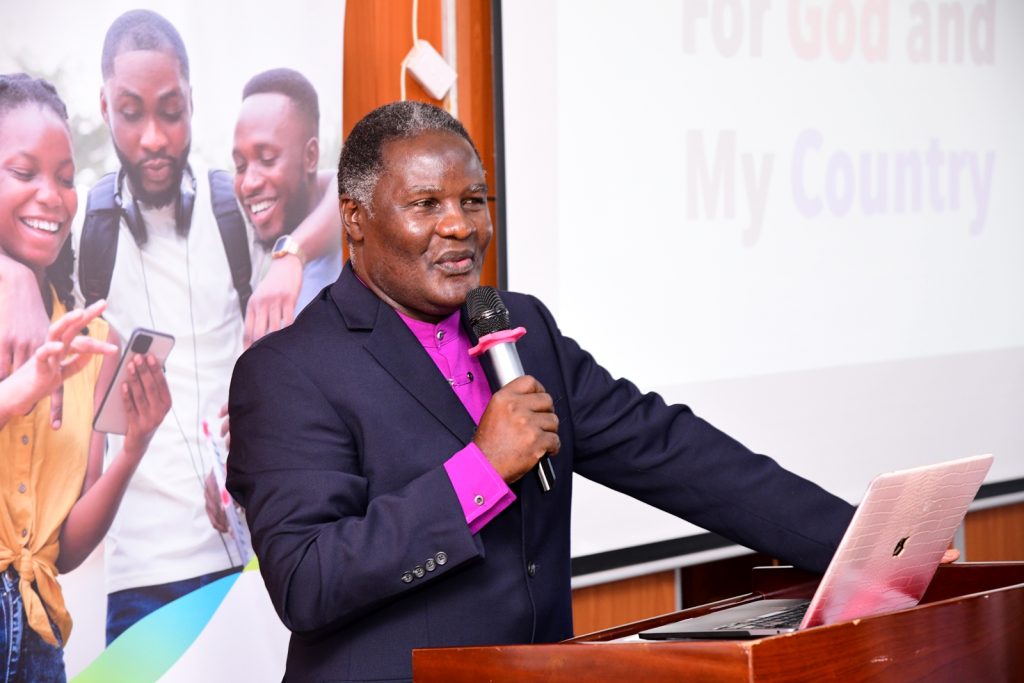
Additional topics covered during the three-day workshop included; Mindset Change by the School of Psychology Makerere University, Character Matters and Sex in Perspective by the LIFE Ministry Uganda’s Dr. Eunice Kateshumbwa and Dr. Audrey Kisaka respectively. Additional topics covered were Grace, Truth and Time, Relationships and Life Skills.
The 89th Guild was on their part commended for their smartness and good grasp when it came to articulating issues. This commendation could not have been more accurate, seeing as it came from The Acting Dean of Students, Mr. Peter Rivan Muhereza. He reminded the Student Leaders that Makerere is a hill of endless possibilities and that the ball was in their court, to lay a solid foundation for their future.
You may like
-


Over 9,200 to graduate at Makerere University’s 76th Graduation
-


Meet Najjuka Whitney, The Girl Who Missed Law and Found Her Voice
-


Makerere University School of Public Health Graduates First Cohort of Cost-Effectiveness Analysis Short Course
-


Climate variability found to shape malaria trends in Yumbe District
-


Mak hosts First African Symposium on Natural Capital Accounting and Climate-Sensitive Macroeconomic Modelling
-


Uganda Martyrs Namugongo Students Turn Organic Waste into Soap in an Innovative School Project on Sustainable Waste Management
General
Over 9,200 to graduate at Makerere University’s 76th Graduation
Published
4 hours agoon
February 24, 2026
Pomp and colour defined the opening day of the Makerere University’s 76th Graduation Ceremony as thousands gathered to celebrate academic excellence and new beginnings.
The historic ceremony has brought together scholars, families, friends and industry partners in a vibrant celebration of achievement and possibility. Throughout the four-day event, the University will confer degrees and award diplomas to 9,295 graduands in recognition of their dedication and hard work.
Among the graduates, 213 will receive Doctor of Philosophy (PhD) degrees, 2,503 will graduate with Master’s degrees, and 6,343 will earn Bachelor’s degrees. In addition, 206 students will graduate with postgraduate diplomas, while 30 will be awarded undergraduate diplomas.
Of the total number of graduands, 4,262 are female and 5,033 are male. According to Vice Chancellor, this marks the first time in 15 years that male graduands have outnumbered their female counterparts.
The best overall graduand in the Sciences, Esther Ziribaggwa, graduated on the opening day with the Bachelor of Agricultural and Rural Innovation and an impressive Cumulative Grade Point Average (CGPA) of 4.77.

The ceremony marks a proud moment for Makerere University as it continues to nurture top-tier professionals across diverse fields.
While presiding over the graduation, the State Minister for Primary Education, Hon. Dr. Joyce Moriku Kaducu, on behalf of the First Lady and Minister of Education and Sports, Hon. Janet Kataaha Museveni, pointed out that Makerere University is a model institution, where leaders are nurtured, scholars are sharpened, and where dreams have been given direction.
In her address, Hon. Museveni, highlighted Government’s deliberate investment in research, innovation, and infrastructure to strengthen higher education in Uganda.
“The establishment of the Makerere University Research and Innovation Fund (RIF), supports high-impact research and innovation that directly contributes to national priorities and development. Through this initiative, thousands of researchers and innovators have pursued practical, scalable solutions that are transforming communities and key sectors across Uganda,” Mrs Museveni, said.
The Minister also noted that Parliament’s approved a USD 162 million concessional loan to upgrade science, technology, and innovation infrastructure at Makerere University. The funding will facilitate the construction of modern laboratories, smart classrooms, and state-of-the-art facilities for Engineering and Health Sciences, investments expected to position the University firmly within the Fourth Industrial Revolution.
“Government has embarked on the construction of a National Stadium at Makerere University and other institutions of higher learning across the country. This will promote physical education, strengthen talent identification, and boost investment in the sports sector,”

Turning to the graduands, the Minister encouraged them to see themselves not merely as job seekers, but as job creators and solution-makers.
Uganda and Africa need innovators who will modernize agriculture; engineers who will build quality infrastructure; healthcare professionals who will strengthen health systems; and educators who will inspire the next generation,” the Honourable Minister said.
She reminded graduates that they are entering a rapidly changing world shaped by Artificial Intelligence, climate change, and shifting global markets. To thrive, she advised them to remain adaptable, creative, and committed to lifelong learning.
She also encouraged graduates interested in entrepreneurship to tap into the Government’s Parish Development Model, which provides community-based financing and production support.
Quoting Proverbs 3:5–6, the Minister urged the graduates to trust in God as they embark on their next chapter.
She extended special appreciation to the Mastercard Foundation for its 13-year partnership with Makerere University in expanding access to education and empowering young people in Uganda and beyond.
In his speech, the Chancellor of Makerere University, Dr Crispus Kiyonga, urged graduands to harness research, innovation and technology to drive Uganda’s transformation.

“This is a milestone in your lives. You have invested time, discipline and hard work to attain these qualifications. It is important that you derive value from this achievement, not only for yourselves, but for your families and for society.” Dr Kiyonga, said.
Dr. Kiyonga expressed gratitude to the Government of Uganda for its continued financial support to the University, particularly the funding allocated under MakRIF, which he described as critical in strengthening the institution’s research capacity.
“Research plays a very vital role in the development of any community. Makerere as the oldest University in the country is doing a significant amount of research, However, more work is required to mobilize additional resources to further strengthen research at the University.” Dr Kiyonga, noted.
Acknowledging the challenges of a competitive job market, Dr. Kiyonga encouraged graduates to think beyond traditional employment pathways.
“It is true that the job market may not absorb all of you immediately. But the knowledge you have acquired is empowering. You can create work for yourselves, individually or in teams.” Dr Kiyonga, said.
He advised the graduands to embrace discipline, integrity and adaptability in the workplace, and to take advantage of technology and digital platforms to innovate and respond to societal challenges.
“Every development challenge presents an opportunity. Believe that you can apply your knowledge to create solutions with impact.” He said.
Addressing the congregation, the Vice Chancellor, Prof Barnabas Nawangwe, congratulated the graduands, particularly staff and societal leaders on their respective achievements.

“I congratulate all our graduands upon reaching this milestone. In a special way I congratulate the members of staff, Ministers, and Members of Parliament that are graduating today as well as children and spouses of members of staff,” Prof Nawangwe, said.
In his speech, Prof Nawangwe, recognized outstanding PhD students, particularly members of staff. who completed their PhDs in record time without even taking leave from their duties.
He called upon graduates not to despise humble beginnings but rather reflect on the immense opportunities around them and rise to the occasion as entrepreneurs.
“You are all graduating with disciplines that are needed by society. We have equipped you with the knowledge and skills that will make you employable or create your own businesses and employ others. Do not despair if you cannot find employment. Instead, reflect on the immense opportunities around you and rise to the occasion as an entrepreneur,” Prof Nawangwe, said.
Prof Nawangwe called upon the graduands of PhDs to use their degrees to transform the African continent.
“As you leave the gates of Makerere I urge you to put to good use the knowledge you have received from one of the best universities in the World to improve yourselves, your families, your communities, your Country and humanity. Let people see you and know that you are a Makerere alumnus because of the way you carry yourself in society with dignity and integrity. Put your trust in God and honour your parents and opportunities will be opened for you,” Prof Nawangwe, said.
Delivering a key note address, Prof. Nicholas Ozor, the Executive Director of the African Technology Policy Studies Network Nairobi, Kenya ((ATPS). Reminded the graduates that a degree is not a finish line but the beginning of accountability. “The world is a complex, fast changing and deeply unequal. Degrees make you responsible for others not better than them,” Prof Ozor, said.

The 76th Graduation Ceremony of Makerere University will be held from Tuesday 24th to Friday 27th February, 2026. A total of 213 PhDs (87 female, 126 male), 2,503 Masters (1,087 female, 1,416 male), 206 Postgraduate Diplomas (80 female, 126 male), 6,343 Undergraduate Degrees (2,999 female, 3,344 male), and 30 Undergraduate Diplomas (9 female, 21 male) will be graduating from all the Colleges.
Ms. Sarah Aloyo and Ms. Nakato Dorothy both students of the Bachelor of Procurement and Supply Chain Management emerged as the best in the Humanities and Best Overall students with a CGPA of 4.93. Mr. Ssewalu Abdul, a Bachelor of Leisure and Hospitality Management student emerged second best in the Humanities with a CGPA 4.90. Ms. Esther Ziribaggwa emerged as the best student in the Sciences with a CGPA of 4.77 in the Bachelor of Agricultural and Rural Innovation, while Mr. Simon Mungudit emerged second best in the Sciences with a CGPA of 4.76 in the Bachelor of Science in Petroleum Geoscience and Production.
Commencement Speakers
- Day 1 – Prof. Nicholas Ozor, the Executive Director of the African Technology Policy Studies Network, Nairobi, Kenya
- Day 2 – Prof. Dr. Maggie Kigozi, Chairperson Makerere University Endowment Fund Board
- Day 3 – Dr. Patricia Adongo Ojangole, Managing Director, Uganda Development Bank Limited
- Day 4 – Ms. Reeta Roy, Former President & Chief Executive Officer, Mastercard Foundation
The 76th Graduation Ceremony will be held at the Freedom Square following the schedule below:
Tuesday, 24th February, 2026
College of Agricultural and Environmental Sciences (CAES)
College of Computing and Information Sciences (CoCIS)
College of Education and External Studies (CEES)
School of Law (SoL)
Livestream Link for Day 1: https://youtube.com/live/wVGPA0FJ9pU
Wednesday, 25th February, 2026
College of Health Sciences (CHS)
College of Natural Sciences (CoNAS)
College of Veterinary Medicine, Animal Resources and Bio-security (CoVAB)
School of Public Health (SPH)
Thursday, 26th February, 2026
Makerere University Business School (MUBS)
College of Business and Management Sciences (CoBAMS)
Friday, 27th February, 2026
College of Engineering, Design, Art and Technology (CEDAT)
College of Humanities and Social Sciences (CHUSS)
Institute of Gender and Development Studies (IGDS)
Makerere Institute of Social Research (MISR)
General
Mak Selected to Host Alliance for African Partnership Africa Office
Published
1 day agoon
February 23, 2026
Makerere University has been selected to host the Africa Office of the Alliance for African Partnership (AAP). The significant milestone that underscores Makerere’s role in fostering research, innovation, and global collaborations across the continent was announced at a meeting of the University’s Central Management with an AAP delegation on 23rd February 2026.
Makerere’s selection was based on the University’s robust commitment, alignment with the AAP’s Strategic Plan, and proven ability to manage consortium activities. The AAP, which was initiated by Michigan State University (MSU) in collaboration with Ten African Universities and agricultural policy research networks in 2016, targets critical challenges in education, youth empowerment, health and nutrition, agri-food systems, science and technology, water, energy, environment, and culture and society.
Addressing the delegation consisting of AAP Co-Directors from MSU, Dr. Jose Jackson-Malete and Dr. Amy Jamison, accompanied by newly-appointed Director of the AAP Africa Office, Dr. Racheal Ddungu Mugabi and Ms. Clare Cheromoi, the Vice Chancellor, Prof. Barnabas Nawangwe who appreciated the choice of Makerere to host the Africa Office said:
“One of the greatest challenges facing African universities is PhD training, particularly supervisory capacity. Through partnerships such as the Alliance for African Partnership we can leverage international expertise to strengthen supervision—whether through training supervisors or through joint supervision arrangements.”
Prof. Nawangwe equally applauded joint initiatives such as the Grant Writing and Publication project, which gave rise to the establishment of a Writing Centre that he said can be used to build capacity in AAP member universities with Makerere as the hub. Officially launched on 21st March 2023, the project is living up to its expectation of becoming a springboard for strong postdoctoral collaborative research for both institutions and other US universities.
Dr. Titus Awokuse, Vice Provost and Dean for International Studies and Programs at Michigan State University (MSU) who attended virtually, reiterated that Makerere’s selection reflects its long-standing commitment to advancing African higher education, research excellence, and meaningful global collaboration.
Reflecting on the origins of the Alliance for African Partnerships (AAP), Dr. Awokuse explained that nearly a decade ago, MSU initiated a transformative conversation in Atlanta centered on the question: How should we partner differently? From this dialogue emerged AAP—an Africa-centered consortium that now brings together 12 institutions across Africa and the United States.

He emphasized that AAP is grounded in equity, mutual benefit, shared leadership, and deep respect for African priorities and expertise. Since its founding, MSU has served as convener and key supporter, working with member institutions to strengthen research collaboration, promote faculty and student engagement, and address shared development priorities.
Dr. Awokuse underscored that AAP’s success is the result of collective vision and commitment, not the efforts of a single institution. He paid tribute to Lilongwe University of Agriculture and Natural Resources for hosting the Africa Office in its early years and acknowledged the foundational leadership of the inaugural Africa Office Director.
He described the launch of the Africa Office at Makerere University as a significant milestone that reinforces Africa-led leadership, strengthens regional collaboration, and enhances responsiveness to emerging opportunities. MSU, he affirmed, remains fully committed to AAP and to working closely with Makerere and all consortium partners to expand collaborative research, nurture the next generation of scholars, and advance Africa-led solutions to global challenges.
The newly-appointed AAP Africa Office Director, Dr. Racheal Ddungu Mugabi is a member of faculty in the Department of Development Studies, Institute of Gender and Development Studies. Her work on intersectional inequalities in Uganda and other Global South regions uniquely positions her to drive collaborative research and partnerships at the Africa Office.
Initially founded by ten African Universities and MSU, AAP now comprises eleven African members including; the African Network of Agricultural Policy Institutes (ANAPRI)-Zambia, Egerton University-Kenya, Lilongwe University of Agriculture and Natural Resources (LUANAR)-Malawi, Makerere University-Uganda, United States International University-Africa-Kenya, Universite Cheikh Anta Diop-Senegal, Universite Yambo Ouologuem de Bamako-Mali, University of Botswana-Botswana, University of Dar es Salaam-Tanzania, University of Nigeria, Nsukka-Nigeria, and the latest, University of Pretoria-South Africa.
These Universites collaborate under Focal Points to advance policy-relevant research and sustainable development. Makerere University’s Focal Point is Prof. Robert Wamala, Director of Research, Innovations and Partnerships (DRIP).
Addressing the University Management, Dr. Jackson-Malete outlined the African Futures Research Leadership Program, which nurtures early career scholars through mentorship and skill-building as one of AAP’s flagship programs. She noted that the Program that prioritizes female participants or men committed to promoting women in higher education has for the first time during its fifth cohort admitted the first male, Dr. Alfadaniels Mabingo from the Department of Performing Arts and Film, Makerere University.
The AAP Africa Office at Makerere will coordinate activities, boost research collaboration, mobilize resources, and enhance global engagements for socio-economic transformation. This aligns with Makerere‘s broader goals of leveraging international expertise to build resilient institutions.
View more photos from the event: https://flic.kr/s/aHBqjCLjoA
Trending
-

 Humanities & Social Sciences2 days ago
Humanities & Social Sciences2 days agoMeet Najjuka Whitney, The Girl Who Missed Law and Found Her Voice
-

 Health6 days ago
Health6 days agoUganda has until 2030 to end Open Defecation as Ntaro’s PhD Examines Kabale’s Progress
-

 Agriculture & Environment5 days ago
Agriculture & Environment5 days agoUganda Martyrs Namugongo Students Turn Organic Waste into Soap in an Innovative School Project on Sustainable Waste Management
-

 General6 days ago
General6 days agoMastercard Foundation Scholars embrace and honour their rich cultural diversity
-

 Health2 weeks ago
Health2 weeks agoCall for Applications: Short Course in Molecular Diagnostics March 2026
